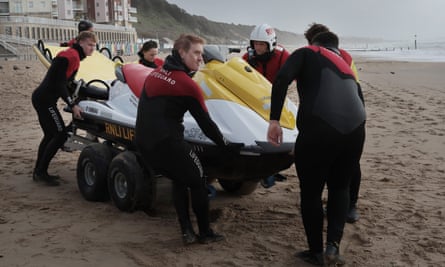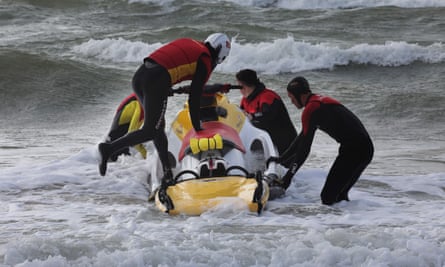
They have passed fitness, strength and capability tests, made sure their casualty care skills are up to scratch and completed online assessments ranging from sun safety to data protection.
As the wind and waves battered the beach, a group of lifeguards at Boscombe in Dorset ran through their final chilly drills on the water before what the Royal National Lifeboat Institution (RNLI) believes will be its busiest summer ever.
“I’ve been working here since 2006 and I’ve seen it get busier and busier,” said the RNLI lifeguard supervisor Tomas Thorndycraft, who was leading the training exercise on Thursday. “There is a strong beach community and culture, a surf school, cafes, refurbished pier.” It means a more crowded beach – and more people who need saving. “But we’re ready for it,” said Thorndycraft.
Before the first wave of beaches – including Boscombe – were patrolled from this weekend as the Easter holidays begin, the RNLI released figures that showed more than 25 million people visited a lifeguarded beach in 2022, the highest since the charity began providing patrols for local authorities in 2001. Lifeguards aided more than 23,000 people in 2022 and saved 117 lives.
RNLI planners believe the cost of living crisis will lead to more people holidaying closer to home, leading to even busier UK and Channel Islands beaches. Improvements to facilities at popular spots such as Boscombe and growing interest in aquatic sports such as surfing and open water swimming have contributed to the increase in visitor numbers.
The RNLI will be particularly alert this spring and summer to paddleboarding incidents, the number attended by lifeguards having increased significantly in recent years, from 247 in 2018 to 1,290 last year.
It is also aiming to recruit new lifeguards in some areas, including the north-east of England, and is keen to point out that people of all ages and all backgrounds are being hired.
The age range of the team on the Dorset beaches, for example, goes from teenagers and twentysomethings to a retired teacher in his 70s. Those training on Thursday included a musician, a stage hand and a health professional. In the spring and summer they either put their winter jobs on hold or juggle them with their beach duties.
Chris Reader, 43, a critical care nurse, said he relished working as a team, whether it was in a hospital or as a lifeguard on a beach. “I love being outside. It’s a fantastic job for anyone who likes working in nature. It’s a beautiful setting come rain or shine. We have a really bonded, well-rehearsed team here that works well together.”
Poppaea Bramwell-Reeks, 23, who travels the world taking part in aquathlons – combined swimming and running events – said she had tried indoor jobs. “But I didn’t get on with them.” This is her third year working as a lifeguard on Dorset beaches. “You get hooked on it; it’s so much fun and no day is the same.”

The first of the spring beaches are due to be patrolled this weekend, joining Crosby in Merseyside, which is covered all year. The number of beaches will gradually increase through the season until the peak school summer holidays, when more than 240 beaches are patrolled.
Kester Sheppard, the RNLI’s lead lifeguard supervisor, said: “Last year’s figures show the importance of our lifeguards and what they do for the public. The RNLI has been working closely with councils and local communities to ensure the beaches and lifeguard units are ready and equipped, and that lifeguard training has been performed seamlessly.
“Pre-season preparations have gone well and our lifeguards are looking forward to getting back on the beaches and doing what they do best: offering preventive safety advice to visitors and rescuing those in difficulty.”



